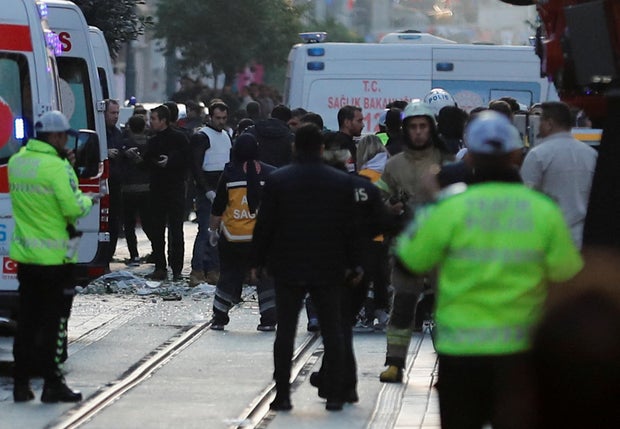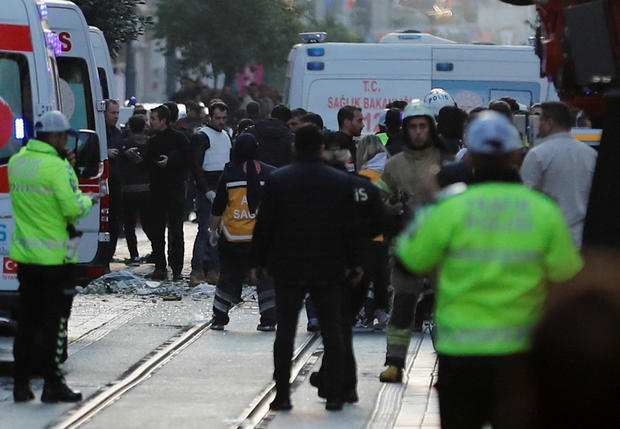Istanbul — A bomb exploded on a major pedestrian avenue in the heart of Istanbul on Sunday, killing six people, wounding dozens and sending people fleeing as flames rose.
At least 81 injuries have been reported so far in connection with the blast, according to authorities. Turkish Vice President Fuat Oktay, while visiting the site of the explosion, told reporters that the blast is considered a terrorist act and that a woman was behind the attack, according to state news agency Anadolu. Derya Yanik, the Turkish minister of family and social services, said in a tweet that one of her colleagues and his daughter were two of the people killed in the explosion.
Footage posted online showed ambulances, fire trucks and police at the scene on Istiklal Avenue, a popular thoroughfare lined with shops and restaurants that leads to the iconic Taksim Square. In one video, a loud bang could be heard and flames seen as pedestrians turned and ran away.
Turkish President Recep Tayyip Erdogan called the blast a “treacherous attack” and said its perpetrators would be punished.
White House press secretary Karine Jean-Pierre said the U.S. “strongly condemns the act of violence that took place” in Istanbul.
“Our thoughts are with those who were injured and our deepest condolences go to those who lost loved ones. We stand shoulder-to-shoulder with our NATO Ally Turkiye in countering terrorism,” Jean-Pierre said in a statement.
Jens Stoltenberg, the secretary-general of NATO, also responded to news of the explosion and said the organization “stands in solidarity” with Turkey.
“Shocking images from #Istanbul,” Stoltenberg tweeted. “My thoughts and deepest condolences to all those affected & to the Turkish people. #NATO stands in solidarity with our Ally #Türkiye.”
In addition to the six people killed, Istanbul Gov. Ali Yerlikaya initially tweeted that another 53 were wounded — casualty counts that Erdogan also gave. Yerlikaya later told state news that the number had grown to 81, as did Erdogan and Oktay, Anadolu reported.

KEMAL ASLAN / Reuters
Erdogan did not say who was behind the attack, but he said it had the “smell of terror” without offering details and also adding that was not absolutely certain yet. He said investigations were ongoing by the police and the governor’s office, including reviewing footage of the area. Speaking at a news conference held ahead of his departure to Indonesia for the G20 summit, Erdogan said that early observations suggest a woman was involved in the attack, and told reporters that whomever is responsible will be identified, according to Anadolu.
Justice Minister Bekir Bozdag told pro-government broadcaster A Haber that investigators were focusing on a woman who sat on a bench by the scene of the blast for about 40 minutes. The explosion took place just minutes after she left. He said her identity was not yet clear, nor was it clear what group might be behind the attack.
Turkey was hit by a string of deadly bombings between 2015 and 2017 by the Islamic State group and outlawed Kurdish groups. More than 500 civilians and security personnel were killed in the attacks.
Following those attacks, Turkey launched cross-border military operations into Syria and northern Iraq against Kurdish militants, while also cracking down on Kurdish politicians, journalists and activists at home.
While the Kurdish militants, known as the PKK, are considered a terrorist organization by Turkey, the United States and the European Union, critics say Erdogan has also used broad terror laws to stifle free speech.
Most recently, Turkey enacted a controversial ” disinformation law ” that carries a prison sentence of up to three years for social media users who disseminate false information about domestic or international security, public order or health. Critics have said the wording of the article is so vague, it can be used to stamp out dissent.
Police on Sunday said they had identified 25 social media users who shared “provocative content” that could fall afoul of that law.
In another example of the country’s restrictions on the press, Turkey’s media watchdog also imposed temporary limits on reporting on Sunday’s explosion — a move that bans the use of close-up videos and photos of the blast and its aftermath. The Supreme Council of Radio and Television has imposed similar bans in the past, following attacks and accidents.
Access to Twitter and other social media sites was also restricted.
French President Emmanuel Macron on Sunday noted that the Istanbul attack came exactly seven years after Islamic State extremists killed 130 people at Paris cafes, the Bataclan theater and France’s national stadium.
“On such a symbolic day for our nation, as we are thinking of the victims who fell Nov. 13, 2015, the Turkish people were hit by an attack on their heart, Istanbul,” Macron said. “To the Turks: We share your pain. We stand at your side in the fight against terrorism.”
- In:
- Turkey
- Explosion
